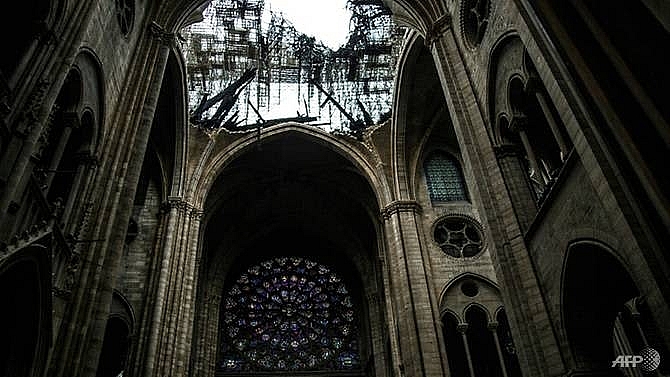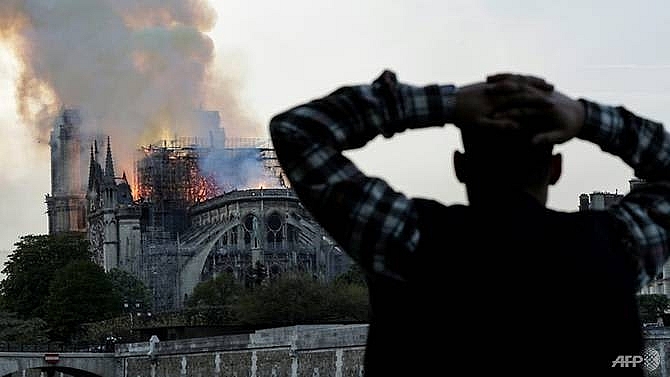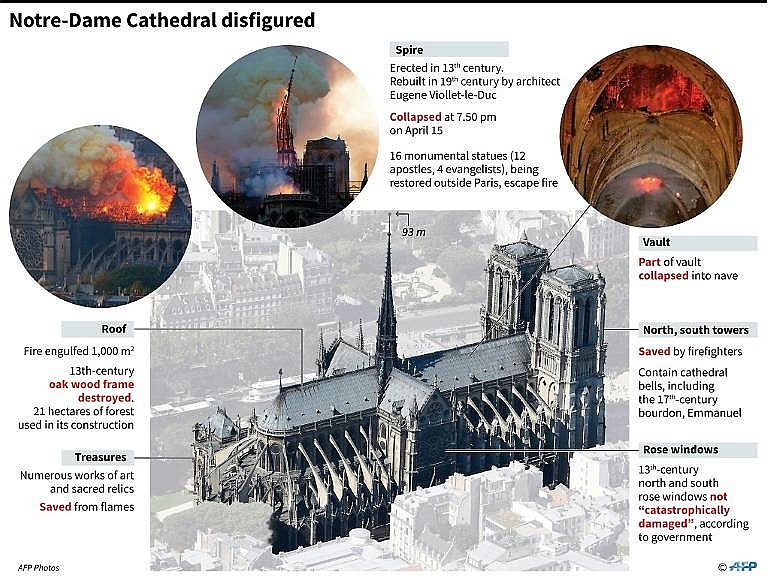Notre-Dame paintings removed amid lead pollution fears
 |
| One of the rose windows below the damaged roof of Notre-Dame. (Photo: AFP/Amaury Blin) |
Officials from the culture ministry were allowed into the 850-year-old landmark to begin retrieving the artworks after fire service officials declared the scorched structure safe enough to go inside.
 |
| The Notre-Dame cathedral was engulfed in flames in central Paris on April 15. (Photo: AFP/Geoffroy Van Der Hasselt) |
Firefighters and engineering experts have been working on the fragile landmark since a devastating blaze on Monday night, erecting scaffolding and other wooden supports to stop any of the stonework collapsing.
"The paintings inside the cathedral have been saved from the flames and can now be taken down and transported to safe areas," France's Culture Minister Franck Riester told reporters at the scene on Friday.
"All of the paintings will be removed today," Riester added, saying that he was feeling "very positive" given how most of the priceless canvasses, many of them dating from the 17th or 18th century, had been saved.
As firefighters inspected the top of the fragile southern facade, art experts began carrying out paintings from the cathedral in protective white film and loading them into trucks.
The artworks were taken to the Louvre museum, a centre of restoration, where experts will repair relatively minor damage caused by smoke or water before storing the paintings until they can be returned.
LEAD POLLUTION?
But as the latest phase of salvage work took place, a French charity warned about the possible health impact from the fire.
The Robin des Bois (Robin Hood) organisation said that around 300 tonnes of lead from the roof and steeple had melted in Monday night's fire, which according to officials had reached 800 degrees Celsius (1,470F) at its peak.
"The cathedral has been reduced to the state of toxic waste," the association said in a statement, calling on French authorities to detoxify the tonnes of rubble, ash and waste water produced by firefighters.
 |
| Details of fire damage at Notre Dame Cathedral, with photos. (AFP/Thomas SAINT-CRICQ) |
"Before launching a competition for the design of a new steeple, we should launch a competition to decontaminate what at the moment, alas, can be considered an industrial wasteland," it added.
After fears about air-borne lead pollution on Monday night, monitoring service Airparif told AFP it did not monitor lead levels in real-time but it has sent its filters to be analysed in a laboratory.
There was no immediate reaction from French authorities to the claims by Robin des Bois, which are of most concern to people living and working on the Ile de la Cite island where Notre-Dame stands.
Lead pollution can cause neurological defects for humans, especially children, as well as nervous system and kidney problems.
ART SAVED
Thanks to a human chain formed by firefighters and church officials on Monday night, the vast majority of the most sacred artifacts and valuable items inside the cathedral were saved.
These include the Holy Crown of Thorns, which Catholics believe was worn by Jesus Christ at his crucifixion, and a tunic thought to have belonged to 13th-century French crusader king, Louis IX, who was made a saint.
Even a copper statue of a rooster containing relics that sat atop the now-destroyed Notre-Dame spire was found among the ashes, dented but intact.
The paintings being brought out on Friday included several of the great "Mays" paintings, which were commissioned between 1630 and 1707 by the Corporation of the Parisian goldsmiths.
The giant canvasses, as big as three metres by four (10 feet by 13), depict events from the life of the Virgin Mary and were offered to the cathedral every May 1 as a sign of devotion.
As the work went on inside Notre-Dame, crowds of Parisians and tourists continued to swarm to the scene, sitting on the banks of the river Seine to observe the cathedral walls, blackened in places, which now stand without a roof.
President Emmanuel Macron welcomed a delegation of officials from the UN's cultural agency UNESCO on Friday to discuss offers of aid from other countries to help restore the beloved emblem of France.
He was accompanied by army general Jean-Louis Georgelin who will oversee the process and has likened his new job to a "combat mission."
Macron has set a five-year deadline to rebuild the architectural marvel, which took around 200 years to build originally from when construction work started in the 12th century.
What the stars mean:
★ Poor ★ ★ Promising ★★★ Good ★★★★ Very good ★★★★★ Exceptional
 Tag:
Tag:
Related Contents
Latest News
More News
- France supports Vietnam’s growing role in international arena: French Ambassador (January 25, 2026 | 10:11)
- Foreign leaders extend congratulations to Party General Secretary To Lam (January 25, 2026 | 10:01)
- Russian President congratulates Vietnamese Party leader during phone talks (January 25, 2026 | 09:58)
- Worldwide congratulations underscore confidence in Vietnam’s 14th Party Congress (January 23, 2026 | 09:02)
- Political parties, organisations, int’l friends send congratulations to 14th National Party Congress (January 22, 2026 | 09:33)
- 14th National Party Congress: Japanese media highlight Vietnam’s growth targets (January 21, 2026 | 09:46)
- 14th National Party Congress: Driving force for Vietnam to continue renewal, innovation, breakthroughs (January 21, 2026 | 09:42)
- Vietnam remains spiritual support for progressive forces: Colombian party leader (January 21, 2026 | 08:00)
- Int'l media provides large coverage of 14th National Party Congress's first working day (January 20, 2026 | 09:09)
- Vietnamese firms win top honours at ASEAN Digital Awards (January 16, 2026 | 16:45)






















 Mobile Version
Mobile Version